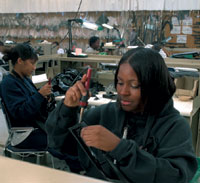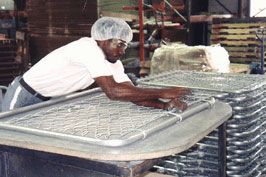影片对白 That makes it okay? I turned
my back on him because I didn't want to make waves. It was just... easier... to
look the other way... keep the plan safe.
我观之我见
在这个弱肉强食的世界里,生存不仅要靠技术和手段,还要有坚定的信念。无论是在监狱内外,这条道理都适用。
考考你 一展身手
3. Turn one's back on
"拒绝,忽略,背弃,抛弃"的意思,例如:I can't turn my back on my own daughter, no matter what
she's done.
4. Make waves
"(诘问,拒绝接受已存在的事实因而)挑起事端,引发争端"的意思,例如:We've finally settled our differences, so
please don't make waves.
5. in a heartbeat
意为"without hesitation",例如:You'd better think over what
I said. I can kill you in a heartbeat.
6. Yesterday's news
"昨天的新闻"会是什么样的新闻?从时效性上来说,当然是已经过时的、无关紧要的了。Yesterday's news means
"irrelevant",Gus 的意思是 Abruzzi从此和监狱工厂再没有关系了。
文化面面观
Prison industry in the U. S.
美国的监狱产业
 Prison labor has its roots in slavery. After the
1861-1865 Civil War, a system of "hiring out prisoners" was introduced in order
to continue the slavery tradition. Freed slaves were charged with not carrying
out their sharecropping commitments (cultivating someone else's land in exchange
for part of the harvest) or petty thievery - which were almost never proven -
and were then "hired out" for cotton picking, working in mines and building
railroads. From 1870 until 1910 in the state of Georgia, 88% of hired-out
convicts were Black. In Alabama, 93% of "hired-out" miners were Black. In
Mississippi, a huge prison farm similar to the old slave plantations replaced
the system of hiring out convicts. The notorious Parchman plantation existed
until 1972.
Prison labor has its roots in slavery. After the
1861-1865 Civil War, a system of "hiring out prisoners" was introduced in order
to continue the slavery tradition. Freed slaves were charged with not carrying
out their sharecropping commitments (cultivating someone else's land in exchange
for part of the harvest) or petty thievery - which were almost never proven -
and were then "hired out" for cotton picking, working in mines and building
railroads. From 1870 until 1910 in the state of Georgia, 88% of hired-out
convicts were Black. In Alabama, 93% of "hired-out" miners were Black. In
Mississippi, a huge prison farm similar to the old slave plantations replaced
the system of hiring out convicts. The notorious Parchman plantation existed
until 1972.
During the post-Civil War period, Jim Crow racial segregation laws were
imposed on every state, with legal segregation in schools, housing, marriages
and many other aspects of daily life. "Today, a new set of markedly racist laws
is imposing slave labor and sweatshops on the criminal justice system, now known
as the prison industry complex," comments the Left Business Observer.
 Who is investing? At least 37 states have legalized
the contracting of prison labor by private corporations that mount their
operations inside state prisons. The list of such companies contains the cream
of U.S. corporate society: IBM, Boeing, Motorola, Microsoft, AT&T, Wireless,
Texas Instrument, Dell, Compaq, Honeywell, Hewlett-Packard, Nortel, Lucent
Technologies, 3Com, Intel, Northern Telecom, TWA, Nordstrom's, Revlon, Macy's,
Pierre Cardin, Target Stores, and many more. All of these businesses are excited
about the economic boom generation by prison labor. Just between 1980 and 1994,
profits went up from $392 million to $1.31 billion. Inmates in state
penitentiaries generally receive the minimum wage for their work, but not all;
in Colorado, they get about $2 per hour, well under the minimum. And in
privately-run prisons, they receive as little as 17 cents per hour for a maximum
of six hours a day, the equivalent of $20 per month. The highest-paying private
prison is CCA in Tennessee, where prisoners receive 50 cents per hour for what
they call "highly skilled positions." At those rates, it is no surprise that
inmates find the pay in federal prisons to be very generous. There, they can
earn $1.25 an hour and work eight hours a day, and sometimes overtime. They can
send home $200-$300 per month.
Who is investing? At least 37 states have legalized
the contracting of prison labor by private corporations that mount their
operations inside state prisons. The list of such companies contains the cream
of U.S. corporate society: IBM, Boeing, Motorola, Microsoft, AT&T, Wireless,
Texas Instrument, Dell, Compaq, Honeywell, Hewlett-Packard, Nortel, Lucent
Technologies, 3Com, Intel, Northern Telecom, TWA, Nordstrom's, Revlon, Macy's,
Pierre Cardin, Target Stores, and many more. All of these businesses are excited
about the economic boom generation by prison labor. Just between 1980 and 1994,
profits went up from $392 million to $1.31 billion. Inmates in state
penitentiaries generally receive the minimum wage for their work, but not all;
in Colorado, they get about $2 per hour, well under the minimum. And in
privately-run prisons, they receive as little as 17 cents per hour for a maximum
of six hours a day, the equivalent of $20 per month. The highest-paying private
prison is CCA in Tennessee, where prisoners receive 50 cents per hour for what
they call "highly skilled positions." At those rates, it is no surprise that
inmates find the pay in federal prisons to be very generous. There, they can
earn $1.25 an hour and work eight hours a day, and sometimes overtime. They can
send home $200-$300 per month.
Thanks to prison labor, the United States is once again an attractive
location for investment in work that was designed for Third World labor markets.
A company that operated a maquiladora (assembly plant in Mexico near the border)
closed down its operations there and relocated to San Quentin State Prison in
California. In Texas, a factory fired its 150 workers and contracted the
services of prisoner-workers from the private Lockhart Texas prison, where
circuit boards are assembled for companies like IBM and Compaq.